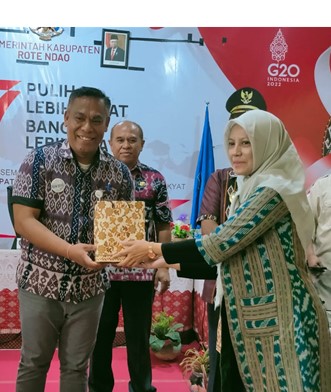To build a strong joint commitment between the Rote Ndao District Government and Bank NTT, and in support of sustainable economic activities in the local community, phase two of the Arafura and Timor Seas Ecosystem Action (ATSEA-2) Project facilitated the signing of a Memorandum of Understanding (MoU) and a Cooperation Agreement (PKS) between the two parties on 23 February 2023, at the Office of the District’s Accelerated Development Team (TBUPP), Rote Ndao District, East Nusa Tenggara (NTT).
This commitment is geared towards conserving the wealth of marine resources in Rote Ndao, which are currently threatened by degradation and damage (particularly from oil spills). The waters of NTT form an integral part of the Arafura and Timor Seas (ATS) region, which is susceptible to a number of threats; its proximity to exploration activities, and its utility as a transportation route for oil, make the ATS particularly vulnerable to spills and other incidents.
The scope of the cooperation agreement includes the provision of loan facilities, production facilities, product packaging and marketing support, as well as bookkeeping systems training, planned for rollout over the next two years. The cooperation agreement signing ceremony between the two parties was officially opened by the Head of Rote Ndao District, Paulina Haning-Bullu, who emphasised the local government’s support for the development of alternative livelihoods for local communities – especially those who depend on marine and coastal resources – to increase their resilience and adaptability.
Haning-Bullu stated that the signing of the MoU and PKS has been carried out to support the improvement of product quality and added value as well as competitive productivity, especially for women and disabled communities. “All of us in Rote Ndao must support and use these local products to help improve the welfare of the community,” she added.

Working in collaboration with the ATSEA-2 Project, positive steps have been taken by the Rote Ndao District Government. This includes facilitating adaptation, capacity building and resilience in communities’ lives, by involving women and persons with disabilities in processing marine products as alternative food sources. In addition to household consumption, marine products can also be marketed to support family economic resilience. In addition, raising awareness and developing the skills of village communities with regards to climate change adaptation has also been facilitated through this effort.
“The Ministry of Marine Affairs and Fisheries (MMAF) through the ATSEA-2 Project supports capacity building, improving the skills of women and disabled communities through practical training in processing marine products,” said Mikael Leuape, who is the Field Facilitator for the ATSEA-2 Project in Rote Ndao. “The hope is for this to be sustainable and to receive intensive mentoring, so that work groups are more confident and useful, and remain resilient in facing the impact of oil spills and climate change in the Rote Ndao region,” he added.
In support of the sustainable development achieved thus far through the ATSEA-2 Project, Bank NTT has initiated a collaboration with the Rote Ndao District Government. “Bank NTT wants to stimulate the economy and strengthen village competitiveness through the Festival of Fostered Villages [an annual event organised by Bank NTT and local government],” explains Sender Dewa Lele, who is the Rote Ndao Branch Manager of Bank NTT. “Hopefully, this can strengthen villages to compete healthily, both in the digital and physical space, with unique and superior values; in addition, there is coaching and initiation for SME actors, market information and off-takers,” he added.
This collaboration forms part of a series of activities that began with the recognition of four community groups supported by the ATSEA-2 Project. There is the Dale Esa group in Daiama Village, which produces mangrove-based drinks and syrups; the Ina Landu group in Landu Tie Village, which specialises in ready-to-eat seaweed products; the Tasi Bo’a group in Bo’a Village, which is known for its massage oil products; and the Ita Esa group in Oeseli Village, which has produced and marketed soap made from marine and mangrove products under the brand name Minano.
With support from the various collaborations outlined above, ATSEA-2 will continue working to empower the people of Rote Ndao. Ultimately, these actions will help those living and working in coastal communities to become more adaptive, more resilient and better equipped to withstand any future threats that may occur.
By Stella Yovita Arya Puteri


